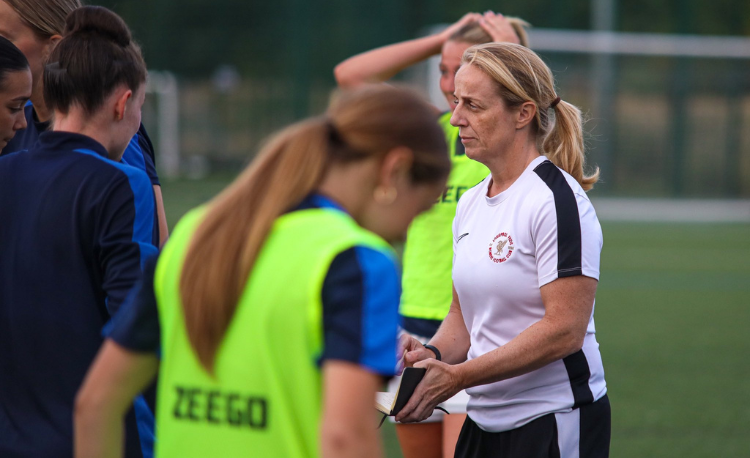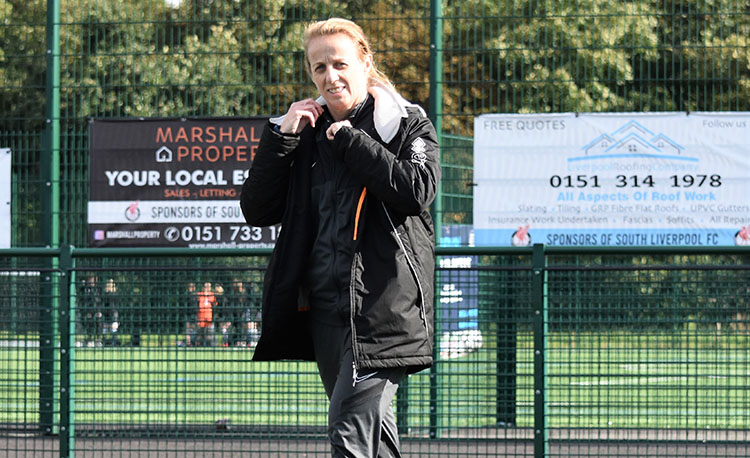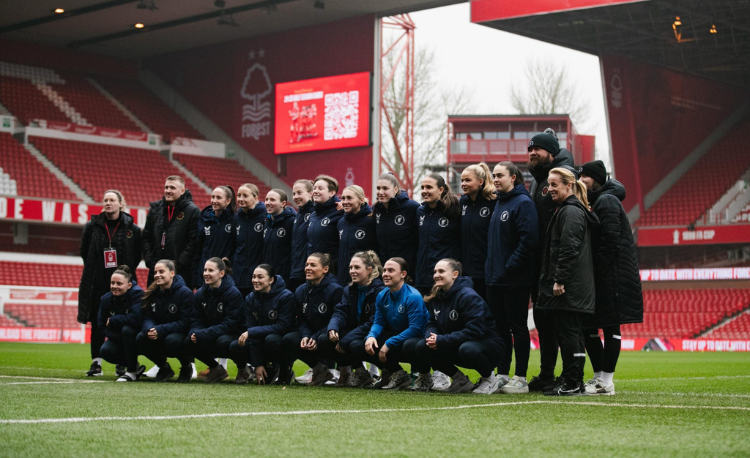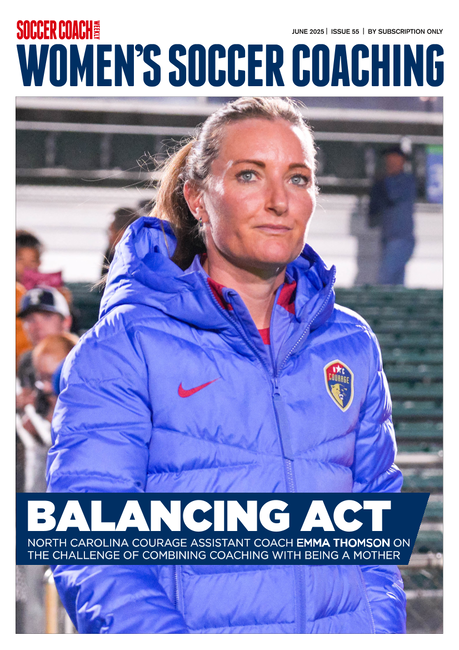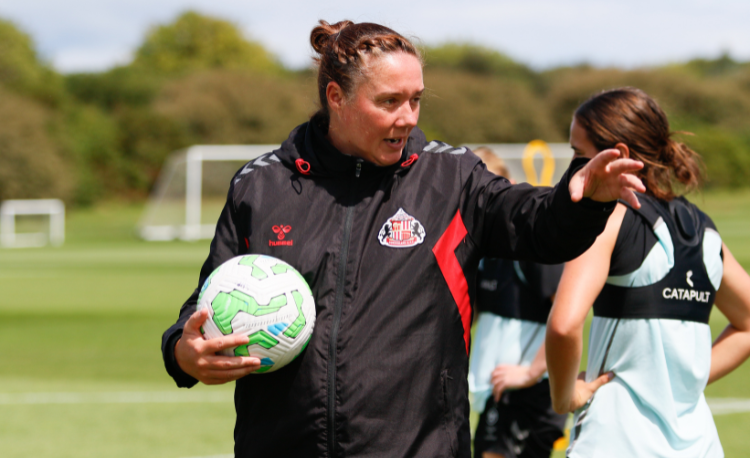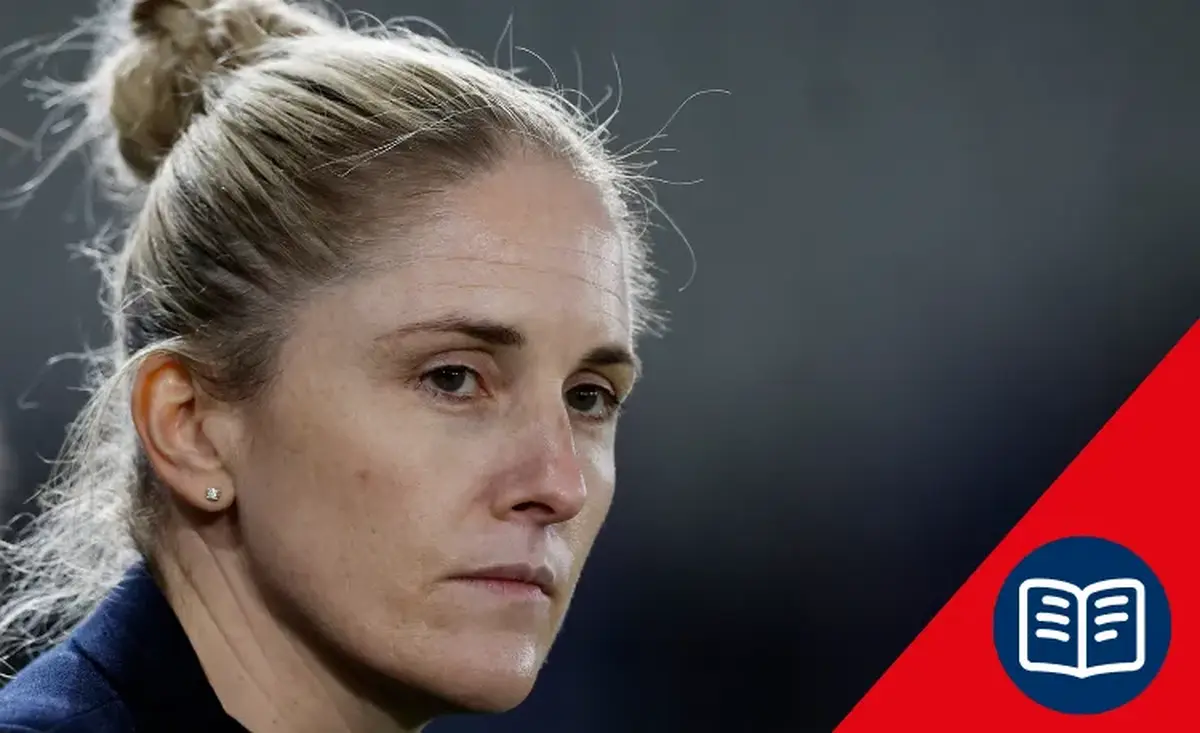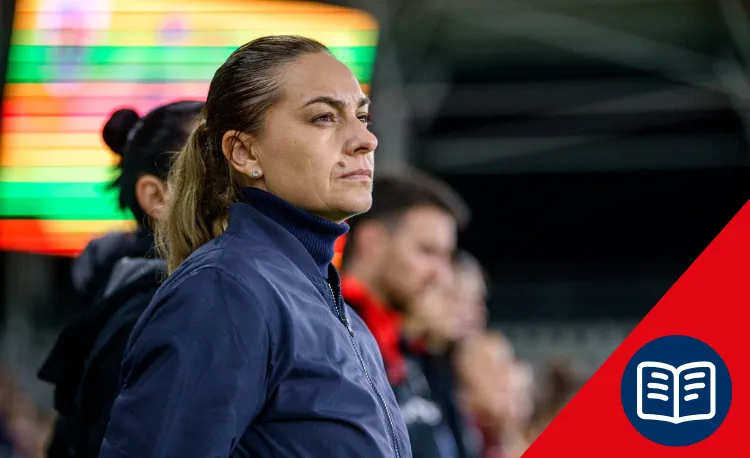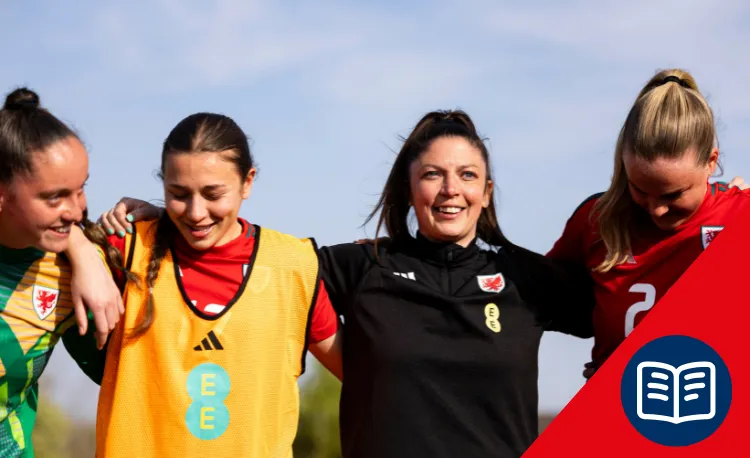You are viewing
1 of your 3 free articles
Leanne Duffy: ‘We sell the 'person before player' value'
Liverpool Feds manager Leanne Duffy speaks to Carrie Dunn about club culture, recruiting players, what she asks from her team, and who she is as a coach
Leanne Duffy’s summer to-do list was clear as soon as the season ended.
Once she booked the training pitch for her Liverpool Feds side, she needed to sit down with her assistant and put together the pre-season friendlies, ready for the beginning of the season in the third weekend of August.
Then she also had to think about her player recruitment plus the training schedule, including strength and conditioning work.
It’s unlikely that many other managers at Liverpool Feds’ level – the FA Women’s National League Northern Premier Division, the third tier of the women’s pyramid - will be quite so hands-on.
Liverpool Feds were formed by a group of university students in the 1990s and those founder members are still involved with the club, which now boasts a thriving junior section and three senior teams, including the first team, which Leanne manages.
Leanne’s time with the Feds
Leanne is about to start her 10th season with the club.
"Feds has a real family feel about it and I think that feel comes from it being an independent club. We set our own culture, which is driven through the teams. We make our own decisions on the club direction. Of course, everybody’s answerable in some respect, but the pressure’s not as intense as it maybe is in these clubs where they’re being driven from the top down."
Of course, that also means that they face some challenges that teams attached to an established club do not. They have less cash to splash than some rivals, but they also can’t draw on built-in staffing or infrastructure.
"There’s huge financial limitations on us, not having that additional resource that lots of clubs have. There’s a small group of people running the club, the committee. That in itself is really testing for us. The more success we have on the pitch, the more is demanded of that small group of people off the pitch and we’ve felt that more than ever, I think, over the last 12 months.
"We haven’t got any assets. We effectively rent a pitch. The pitch we rent, it’s not a stadium. It doesn’t allow us to generate any income from that."
Player recruitment
Recruitment is always one of Leanne’s major tasks over the close season, and Feds’ independence can sometimes prove an obstacle.
"Whenever we bring people in, they love it and they can’t speak highly enough of it, but lots of people won’t consider us because we’re not a big name with a stadium to play in and with the things that unfortunately attract people these days."
Instead, Leanne has to flip that in her favour and she looks to promote the factors that make Feds a unique club.
"We very much sell the ’person before player’ value. That is part of our ethos and we try our best to uphold that throughout the club."
Recently, Feds’ recruitment has tended to focus on players with dual registrations - signed to an elite academy and looking for senior game time, such as Amy Richardson, who went on to sign for Celtic, and Alicia Collins, who signed for Stoke City - or dual careers - those who will not be pursuing full-time football and balance it with their day job.
"Over the last few years, there’s a lot of youngsters looking to get a foot in the game, and if we do manage to attract them, generally, it’s dual signing from one of the academies. We know it’s really important to blend that with experience.
"One without the other doesn’t work. We can’t have a team full of experienced players - you need that youth."
But it’s not just about the number of games someone has played. Leanne is also looking for a player who suits the club.
"Does she fit into the culture, and does she improve the team? It has to tick both boxes. It’s served us well.
"We’ve attracted really, really good people to the club. I don’t think there’s many people I would say we’ve brought in who haven’t fitted in. So that’s a testament to the group, the core group that we have, who do their best to help people fit in."
It means Leanne has to think about her pre-season planning in a way that many coaches might not have to.
"We’re not quite sure if this player is staying, we’re not quite sure whether they’ll commit to us for another year. I’m probably no different to a lot of other teams in that respect, except maybe the teams make the decisions rather than allowing the player to make the decisions.
"It’s tough. It used to be that you would finish your last game of the season, and then you would put the ball away for a month. That just does not [happen] now, it’s almost like you’ve got to get your work done [in May]."
Player commitment
For many years, Feds have had an unwritten rule that a player had to train at least once during the week to be considered for selection on Sunday.
"Unfortunately, over the years, that has punished people who work shifts. We have a number of players who work in the police, who work in the fire [service], work in hospitals, where shift work is really apparent.
"There are some times when that rule will come back and bite us. It has done over the years, but, ultimately, it’s the only thing that keeps us accountable. When you’re not paying your players and you’ve not got contracts, it’s the only thing that keeps your players accountable for training, and it works more often than it doesn’t."
It may feel like an old-fashioned approach now that teams in Tier 3 and even below are pushing towards professionalisation and have huge playing budgets in their own right.
"Our ethos hasn’t changed. There are times when it becomes more difficult because the bigger clubs with big resources will snap up the players and not play them all season.
"But that’s on the player. If a club has the resources and finances to do that, they will do that. We have to try and encourage these players to see that it’s more important to play than to have a status of ’I’m at a professional club’, ’I’m at a semi-professional club’. They’re not getting the exposure they need. We try and make the most of not being able to attract these players as a permanent player by taking them on loan, but again, the loan is really difficult to arrange just from a financial aspect because we’re not able to offer anything back to that club."
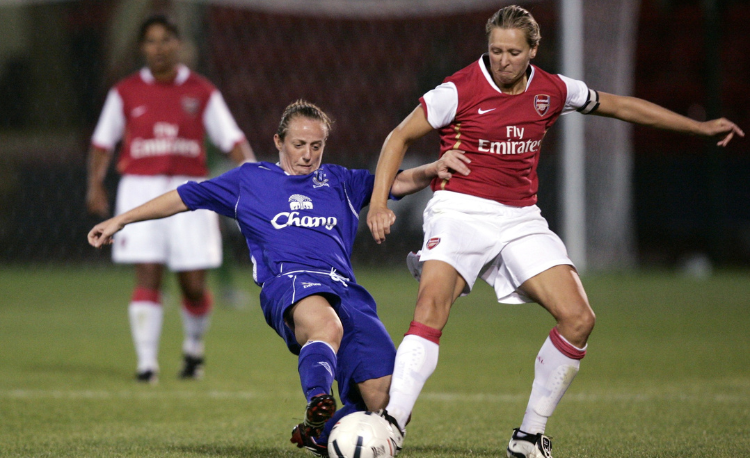
Leanne’s playing career
Leanne had a distinguished playing career herself, and names the legendary Everton coach Mo Marley – under whom she played for many seasons – as an inspiration to her, although she says their coaching styles are quite different. Another Everton manager, Andy Spence, has been a mentor to her.
“Every time I speak to him, he energises me with his passion and his ideas. Over the years, he’s been quite key for me when I’ve needed picking up or when I’ve needed something, he’s always been on the end of the phone for me.”
Even though Leanne’s to-do list might not get any smaller, she knows that working at Feds has enabled her to develop elements of her coaching that she might not have been able to at another club.
"A big part of my success at Feds has been how I’ve been able to relate to the players, I suppose," she says. "I’ve always wanted that kind of approach with the players where they can come and talk to me. They can tell me they’re unhappy. I’ve always wanted that, and sometimes that makes it really difficult for me. If you open yourself up to the emotional side, then the decisions become really difficult.
"But I think that’s probably been my biggest development, as a person as well as a manager - actually communicating. As difficult as it is, just communicate. They might not like what you say or they might not like your decision, but as long as you communicate it, they can accept it.
"I’ve been allowed to grow. I’ve been allowed to do that. It took maybe six years, seven years where I was comfortable having these discussions and conversations with people about why they weren’t playing or why this, that, and the other. It doesn’t get easier. You just become more hardened to it, I think."
Leanne welcomes the chance to network with other coaches, or as she puts it, “be in a room, listening to other people’s experiences”. She thinks sharing knowledge in that way helps to develop those soft skills of player management, which aren’t necessarily covered on formal coaching qualifications.
“They don’t all toe the line. They don’t all listen to you. They don’t all turn up and tick every box every session. So how do you deal with these different personalities?
“I think there’s some value in a workshop that’s just swapping ideas around. The most difficult part of the game is dealing with different personalities, but I suppose that’s life – that’s everywhere, it’s not just football!”
Leanne on opportunities for players to move into coaching
Leanne would like to see more opportunities for current players further down the women’s football pyramid to pursue their coaching badges. At the moment, most of the courses run over a weekend, when players have matches.
“I wouldn’t have done that!” she admits. “I wouldn’t willingly say, ‘I’m not going to play that weekend, because I’m going to do a course.’
“Put one on for current players. The location might be a problem, but they’ve got to look at that.”
“I just don’t see how that is sustainable” – Leanne on moving towards professionalism further down the pyramid
Leanne is wary of the push towards swift growth and increased professionalisation further down the pyramid beyond the newly-rechristened WSL2.
"I just don’t see how that is sustainable when teams can’t generate their own funds through supporters," she says.
Increasing attendances throughout the women’s pyramid is a constant challenge for clubs. Leanne points to some of the innovations that the WSL has tried over the last 15 years to encourage bigger crowds more regularly, including the initial schedule of operating over the summer.
"That should have worked," she says. However, she adds that clubs did struggle to find viable pitches – and if a summer league were tried now, there would be a new problem – the international calendar.
“That’s trickled down to tier 3,” she points out. “Almost every team in the league has got one or two international players.”
Newsletter Sign Up
Newsletter Sign Up
Discover the simple way to become a more effective, more successful soccer coach
In a recent survey 89% of subscribers said Women's Soccer Coaching makes them more confident, 91% said Women's Soccer Coaching makes them a more effective coach and 93% said Women's Soccer Coaching makes them more inspired.
*includes 3 coaching manuals
Get Inspired
All the latest techniques and approaches
Women's Soccer Coaching offers proven and easy to use soccer drills, coaching sessions, practice plans, small-sided games, warm-ups, training tips and advice.
We've been at the cutting edge of soccer coaching since we launched Soccer Coach Weekly in 2007, creating resources for the grassroots youth coach, following best practice from around the world and insights from the professional game.
